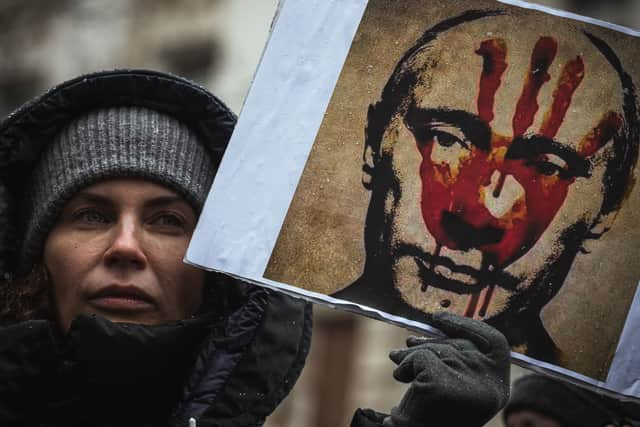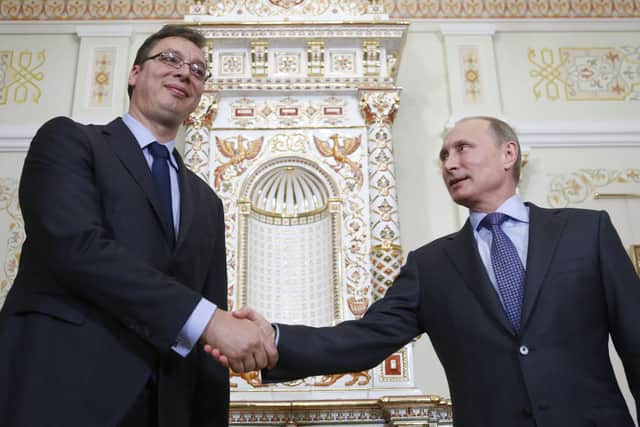Serbia: where is it, EU and NATO membership, Kosovo war, Ukraine, Russia relations - are Wagner Group recruiting?
and live on Freeview channel 276
Outrage in Serbia has been sparked by a Russian news video purporting to show Serbian volunteers training to fight with Russian troops in Ukraine.
The Serbian-language videos were produced by the Russian Wagner mercenary group to promote recruitment for the conflict, and reveal the country’s complicated relationship with Moscow.
Advertisement
Hide AdAdvertisement
Hide AdThe Russian ambassador and the head of Serbia’s state security and information agency (BIA) were both accused of recruiting for the Wagner Group, according to criminal accusations filed on Thursday (19 January) by a lawyer based in Belgrade and anti-war organisations.
Aleksandar Vučić, the president of Serbia, responded angrily on national television. “Why do you, from Wagner, call anyone from Serbia when you know that it is against our rules?” he said.
It is illegal for Serbs to participate in conflicts abroad. In 2014, some did participate in combat alongside Russian soldiers in Ukraine, but without any kind of official state support; Serbian courts found more than two dozen individuals guilty of "fighting on foreign battlefronts."
Serbia is frequently charged by critics with putting its longstanding alliance with Russia ahead of its desire to join the EU, but is it truly a friend of Moscow, and could it ever be drawn into the conflict? Here is everything you need to know about it.
Is Serbia part of NATO?


Advertisement
Hide AdAdvertisement
Hide AdSerbia is not currently part of NATO, and its relationship with the alliance is complex to say the least, going back to the Kosovo War, a conflict that occurred from 1998 to 1999.
Tensions flared between Serbia and the region of Kosovo, as ethnic Albanians in the latter engaged in combat with ethnic Serbs and the Yugoslavian government.
NATO’s intervention ultimately helped to end the conflict, which attracted significant worldwide attention, when the Federal Republic of Yugoslavia’s then-president Slobodan Milosevic agreed to accept NATO’s requirements for halting its 78-day bombing campaign.
2008 saw the declaration of Kosovo’s independence from Serbia, but Belgrade has refused to officially recognise the breakaway. Support in Serbia for NATO integration sharply declined after the Alliance expressed the explicit backing of Kosovo.
Advertisement
Hide AdAdvertisement
Hide AdAlthough joining NATO is not a priority for Serbia right now, the Alliance has extended an invitation for the nation to join its intensified dialogue programme whenever it is ready, and the two regularly participate in military manoeuvres together.
But the threat of further escalation in Serbian/Kosovo tensions threatens to derail the two parties’ relatively amicable relationship. In December 2022, Serbia deployed its forces to the Kosovo border on “the full state of combat readiness,” defying NATO’s requests for the two nations to de-escalate their hostilities.


Is Serbia an ally of Putin?
With regards to the ongoing conflict in Ukraine, none of Serbia’s major political parties have suggested that they support the invasion; the country has regularly supported United Nations resolutions denouncing Russian aggression.
In recent comments made in light of the Wagner Group videos, President Vučić once again highlighted Serbia’s "neutral" stance toward the conflict. He said he had not spoken to Russian President Vladimir Putin in "many months,” and declared that, “For us, Crimea is Ukraine, Donbas is Ukraine, and it will remain so.”
Advertisement
Hide AdAdvertisement
Hide AdBut critics frequently accuse Serbia of prioritising its longstanding relationship with Russia over its desire to join the EU.
Serbia is currently in the process of joining the EU, and submitted its official membership application in December 2009. Talks are still ongoing, but it is hoped that if negotiations are successful by the end of 2024, it will be able to join the Union in 2025.
However, it has consistently refused to place sanctions on Russia since the war began - Belarus being the only other European nation that has also so far resisted imposing sanctions - something that could put the brakes on it joining the bloc.
In reaction to Russia’s invasion of Ukraine, Vučić said that while Serbia believed it was wrong to violate the country’s territorial integrity, it also believed sanctions against Russia were not in its best interest. Furthermore, at a time when countries were imposing sanctions on Russia, Serbia was setting up new gas deals with it, further its politlcal dependency on Moscow.
Advertisement
Hide AdAdvertisement
Hide AdThe European Parliament has said such unwillingness to impose sanctions “damages [Serbia’s] EU accession process,” and MEPs have approved motions requesting the postponement of membership talks until it consents to sanctions twice in the past.
Serbia’s reluctance to sanction Moscow could be down to Russia being one of the few international bodies that has expressed support for Serbia’s claim over its former province of Kosovo.
Vladimir Putin has even previously gone so far as to say that the recognition of Kosovo’s independence by numerous nations was a "a terrible precedent" that "breaks up the entire system of international relations" that have taken "centuries to evolve”.
“Undoubtedly, it may entail a whole chain of unpredictable consequences to other regions in the world,” he said, that will come back to hit the West "in the face".
Advertisement
Hide AdAdvertisement
Hide AdMore recently, Russia backed Donald Trump mediated accords for rapprochement between Kosovo and Serbia in 2020, further muddying the waters between Moscow and Belgrade’s relations.
Could Serbia ever be drawn into the conflict?
As to whether Serbia could ever be drawn into the Ukraine/Russia conflict, say for instance if a stray missile were to land on its territory, that seems highly unlikely.
At their closest points, the borders of Serbia and Ukraine are separated by roughly 175 miles.
While there is support for Russia within Serbia, it comes mostly from the People's Patrol, a far-right anti-immigrant and vigilante group established in 2020, who have organised rallies attended by thousands of pro-Russian Serbs in the past.
Comment Guidelines
National World encourages reader discussion on our stories. User feedback, insights and back-and-forth exchanges add a rich layer of context to reporting. Please review our Community Guidelines before commenting.
